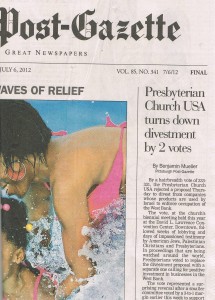 The final full day of the PCUSA General Assembly was approached by commissioners with a sense of apprehension and foreboding. The Assembly, it was now clear, was divided almost 50 50 with razor sharp numerical divisions. The Rev. Jack Baca from San Diego Presbytery, moderator of the assembly’s Middle East Peacemaking Committee, put a brave face on the previous night’s defeat but it was obviously a disappointment – and surprise – that his majority report was not approved. “We have not retreated from our goal” and the Assembly’s rejection had “spurred a deeper commitment for peace in the Holy Land,” he asserted.
The final full day of the PCUSA General Assembly was approached by commissioners with a sense of apprehension and foreboding. The Assembly, it was now clear, was divided almost 50 50 with razor sharp numerical divisions. The Rev. Jack Baca from San Diego Presbytery, moderator of the assembly’s Middle East Peacemaking Committee, put a brave face on the previous night’s defeat but it was obviously a disappointment – and surprise – that his majority report was not approved. “We have not retreated from our goal” and the Assembly’s rejection had “spurred a deeper commitment for peace in the Holy Land,” he asserted.
At the end of the morning at worship the preacher was ruling elder Tony De La Rosa, Executive Presbyter for New York City Presbytery, who referenced his mother, his partner, and his partner’s mother. Using once again the lowering of the paralytic he said that “In Christ the barriers to grace are removed once and for all.” It was an agenda-driven sermon. I thought back to Manhatten Presbyterian luminaries such as George Buttrick and Canadian John Sutherland Bonnell, and fundamentalists John Hess McComb and Walter Duncan Buchanan at Broadway Church at 116th St., where I was taken as a child. It’s a different denomination today and it appears not anchored.
In a memorable speech at the beginning of the afternoon Michael Wilson, Chestnut Level Presbyterian Church in the rural heart of conservative Lancaster County, Pennsylvania, stated that he was “proud and it was an honor to serve the PCUSA” and declared his commitment to building a “balanced vital community of faith.” He went on to warn that “narrow legislative victory has not worked well for the church.” “We have not listened to one another.” And he concluded with a plea: “please join us by not sharpening the divisions.” He knows of what he speaks: his Donegal Presbytery has been heavily impacted by departures of significant congregations, but always done in a gracious Christian way.
The recommendation of “Committee 13” to revise the definition of marriage came in at 2:40 pm. Much of that debate repeated points made in earlier committee sessions on my Monday blog, though Brittany Tamminga of San Diego, a Theological Student Advisory delegate from Princeton Seminary, provided an unusual definition of calling, urging the Assembly not to deny LGBT their calling and asking commissioners to respect God’s calling, an interesting definition of the Reformed doctrine of vocation. The geographical spread seemed predictable: speakers from New York state and the Northeast being outspokenly in favour of revision of the definition of marriage. Overseas delegates pleaded with the Assembly to consider the impact a positive vote would make on relations between their churches and the PCUSA.
By 5:20 pm, after working through (and dismissing) two minority reports, the question was called. The advisory delegates were polled first – the Theological Students were 80% in favour of revision, as were 75% of the Youth Advisory delegates. The ecumenical representatives were split fifty/fifty and the missionaries not unsurprisingly came in at 21% in favour, 71% opposed. The final tally was 48% in favour, 52% opposed. The room emptied quickly, consternation was apparent: the Assembly had looked at the abyss and had failed to jump, deciding not to risk the future of the denomination for the uncertainties of surrendering to the culture. Debate ground on in the evening, completing business at 1:30 Saturday morning. The evening, I was told later (I did not stay), was largely a rubber-stamping of leftover committee recommendations. The next morning delegates returned for a final short session.
In reflecting about what I witnessed in Pittsburgh, I have been struck by the relevance of New York Times op-ed writer Ross Douthat’s just published Bad Religion: How We Became A Nation of Heretics. “America’s problem,” he states there, ” isn’t too much religion, or too little of it. It’s bad religion: the slow motion collapse of traditional Christianity and the rise of a variety of destructive pseudo-Christianities in its place. Since the 1960s, the institutions that sustained orthodox Christian belief – Catholic and Protestant alike – have entered a state of near terminal decline. The churches with the strongest connection to the Christian past have lost members, money, and authority; the elite that was once at least sympathetic to Christian ideas has become hostile or indifferent; and the culture has turned its back on many of the faith’s precepts and demands.” (p. 3) No more insightful statement on the state of mainline Protestant denominations could be provided.

I have enjoyed reading your perspectives on the General Assembly. Unfortunately, the Friday assembly went on to 1:30 AM (they called it then because the bus contracts ended at 2 AM) and we were back at it at 9 AM on Saturday. The big issue was recommended changes to the “special gift offerings.” After a couple hours of debate, nothing was changed. I am working on my report on the GA and when it is done I will post it in my sermon blog.